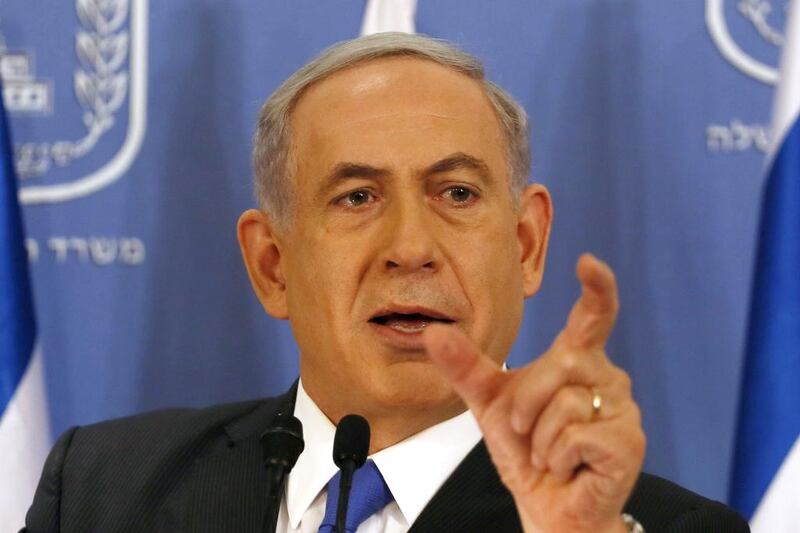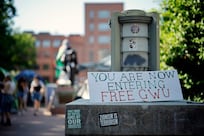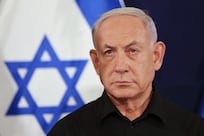Benjamin Netanyahu didn’t want to talk about the Palestinians when elected prime minister for the second time in 2009. He wanted to talk about Iran, and how its nuclear development posed an existential threat to Israel. But that threat hasn’t materialised – if anything, the trajectory is going in the opposite direction with Tehran having slowed its nuclear work while negotiating with the West. And last week, Tamir Pardo – head of Israel’s Mossad intelligence agency – was quoted as saying Iran would not be an existential threat to Israel.
More worrying for Mr Netanyahu, perhaps, was the fact that Mr Pardo bluntly asserted that the greatest threat facing Israel was, in fact, its unresolved conflict with the Palestinians. That’s because Mr Netanyahu has sought to convince Israelis and the world that the status quo with the Palestinians is sustainable, and that pressing for a political solution is dangerous.
The reason the death of three teenage settlers murdered after their abduction on June 12 was so shocking to Israelis was that it shattered their sense of normality over the occupation. Israelis have stopped thinking about terms for peace with the Palestinians, because it’s not a priority – there’s been no downside to the occupation for Israel until this year, when John Kerry warned that by continuing the occupation, Israel risked becoming as isolated as apartheid South Africa once was.
Mr Netanyahu, however, seemed to be going the other way. In a speech two weeks ago, he cited not Iran but the break-up of Iraq and Syria as evidence to back his case that the Israeli military would need security control over the West Bank for the foreseeable future, which would rule out an independent Palestinian state.
For Mr Netanyahu, a two-state political solution is not something for the near future. Besides desultory talks with Mahmoud Abbas, he has touted the idea that economic development and gradual easing of restrictions within the enclaves of the West Bank currently controlled by Palestinians will deepen the “economic peace” that has ensued on his watch. But the kidnappings, the backlash and the resultant explosion of Palestinian rage have served as a wake-up call.
Yuval Diskin, who served as head of Israel’s Shin Bet security service until 2011, wrote on Sunday that nobody ought to have been surprised. The events of the past two weeks, he said, were the product of the Netanyahu government adopting policies premised on the belief that the status quo can be sustained while settlements expand into an irreversible reality.
“This illusion worked wonderfully as long as the security establishment was able to provide impressive calm on the security front,” Diskin wrote, per the translation of Forward writer JJ Goldberg. “The deterioration is first and foremost a result of the illusion that the government’s inaction on every front can actually freeze the situation in place … the illusion that everything can be solved with a little more force, the illusion that the Palestinians will accept everything that’s done in the West Bank and won’t respond despite the rage and frustration and the worsening economic situation … and so on.”
The Israeli government appears to have not properly reckoned with the consequences of making clear that there’s no longer a “peace process”.
One consequence appears to be that international society is moving beyond the default setting of the past 20 years that the conflict will be resolved by US diplomacy and that other parties should stay out. Another seems to be the onset of a new security crisis, in which it’s harder to sustain the narrative that Israel and the Palestinian leadership are pursuing the same goals.
The Israelis recognise that the PA security forces have been vital to the calm they’ve enjoyed in the West Bank over the past five years. But while Mahmoud Abbas insists that security cooperation with Israel is “sacred”, he may eventually struggle to convince his men of the same. Gen Keith Dayton, the US officer deployed by George W Bush to mentor the PA security forces, warned in 2009 that those forces could only be counted on to the extent that they are convinced they are the army of a Palestinian state-in-the-making. They have no interest in being a gendarmerie of the occupation. “There is perhaps a two-year shelf life on being told that you’re creating a state, when you’re not,” Gen Dayton warned. The political process towards statehood has, if anything, gone backwards since.
Dayton’s warning is clearly being echoed by many in the Israeli security establishment. But Mr Netanyahu doesn’t appear to share their sense of urgency about ending the occupation. And it’s the occupation, per Diskin and Pardo, that remains the key source of Israel’s security problems.
Tony Karon teaches in the graduate programme in international affairs at the New School in New York





